Today’s feature is brought to you by the color black.
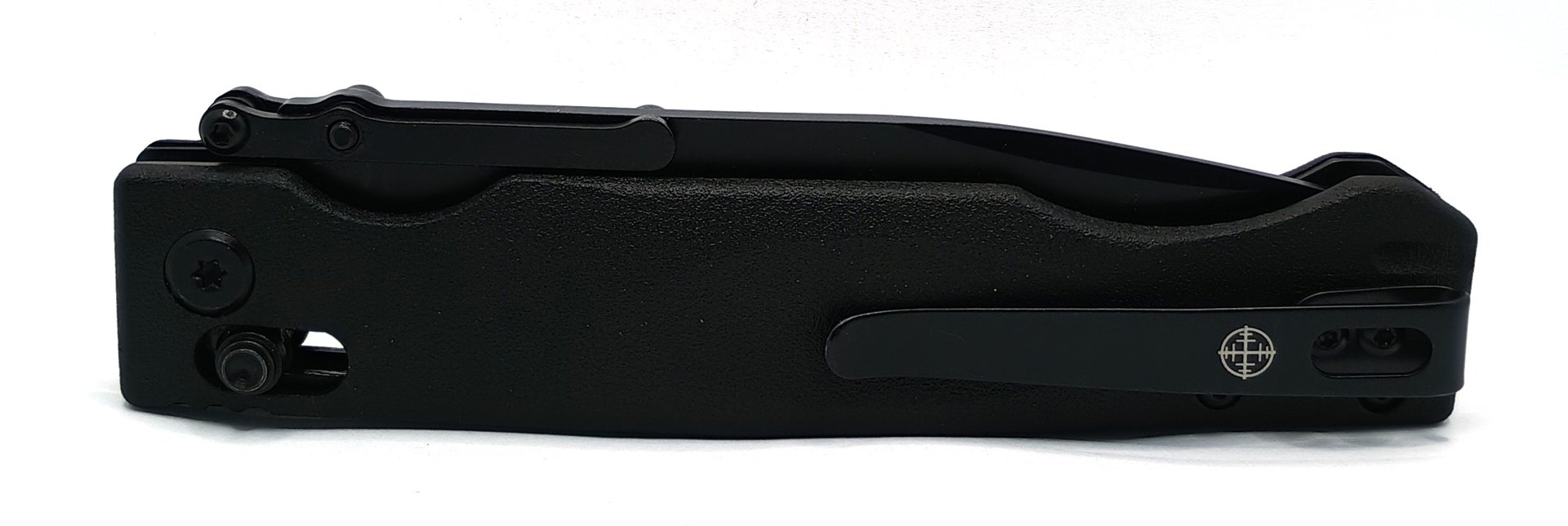
This is the Elite Tactical Guardsman, and when you see all three of those words together you know you’re about to see a Very Serious Combat Knife. Or, perhaps, something that just takes itself a little too seriously.
The Guardsman answers a question that I think very few people have actually asked: Why don’t folding knives ever have crossguards on them?
Actually, I think it doesn’t quite ask “why” but rather skips right to answering “how.”
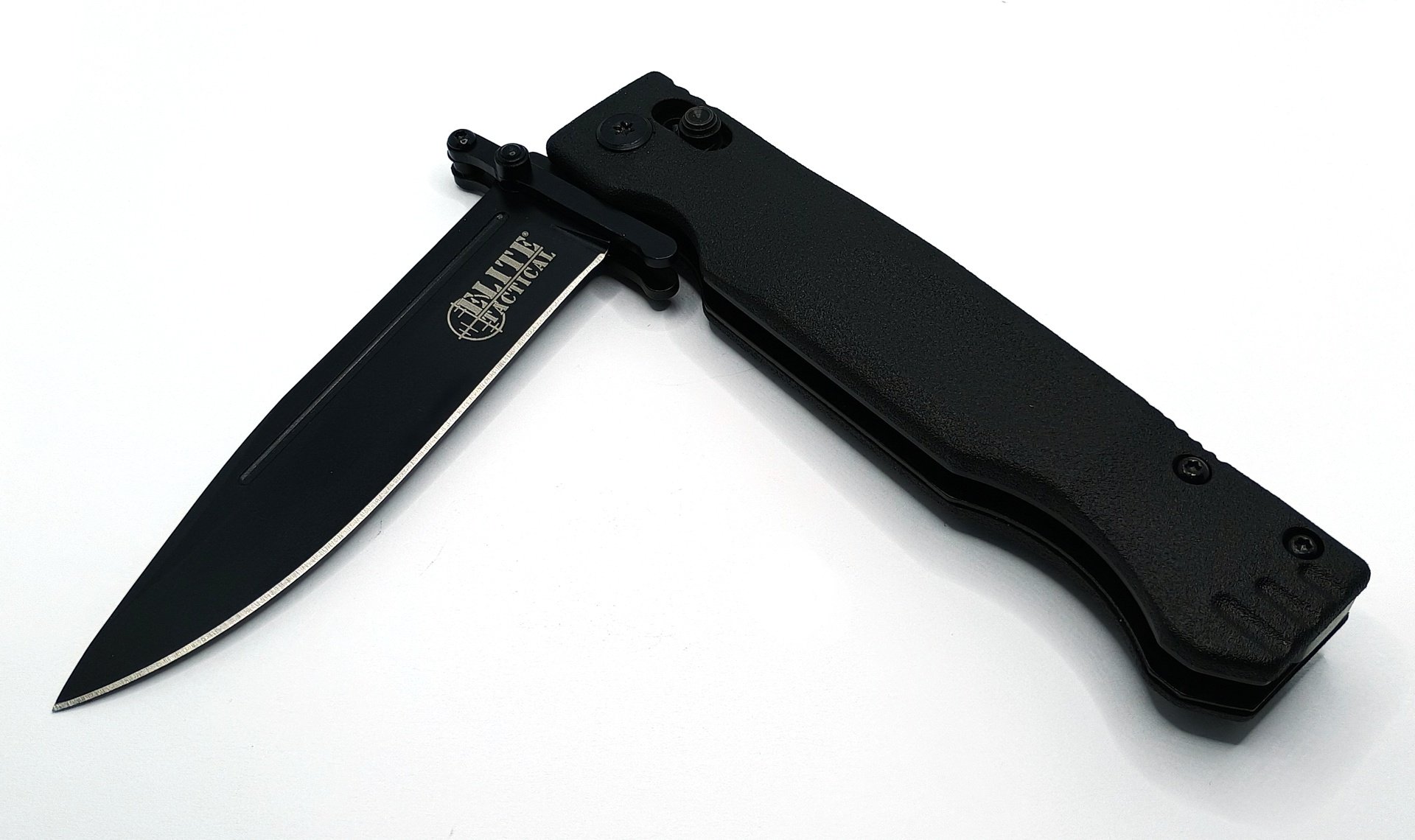
It is written, for some damn reason, that a “fighting” knife should have a crossguard. So of course there have been oodles of attempts to incorporate a daggerlike crossguard into a folder in the past, some solutions being more awkward than others. This is a perennial contender, for instance. Or the likes of the CRKT M-16. Et. cetera. This sort of thing has been going on one way or another for a very long time.
What most of these have in common is that they’re just as wide and doofy when they’re closed as when they’re open, either incorporating the crossguard into the heel of the blade so it’s always sticking out, or building it into the handle in some way.

The Guardsman, however, takes a different approach. To maintain a sleek overall profile when it’s closed, its crossguard folds flat against the handle.
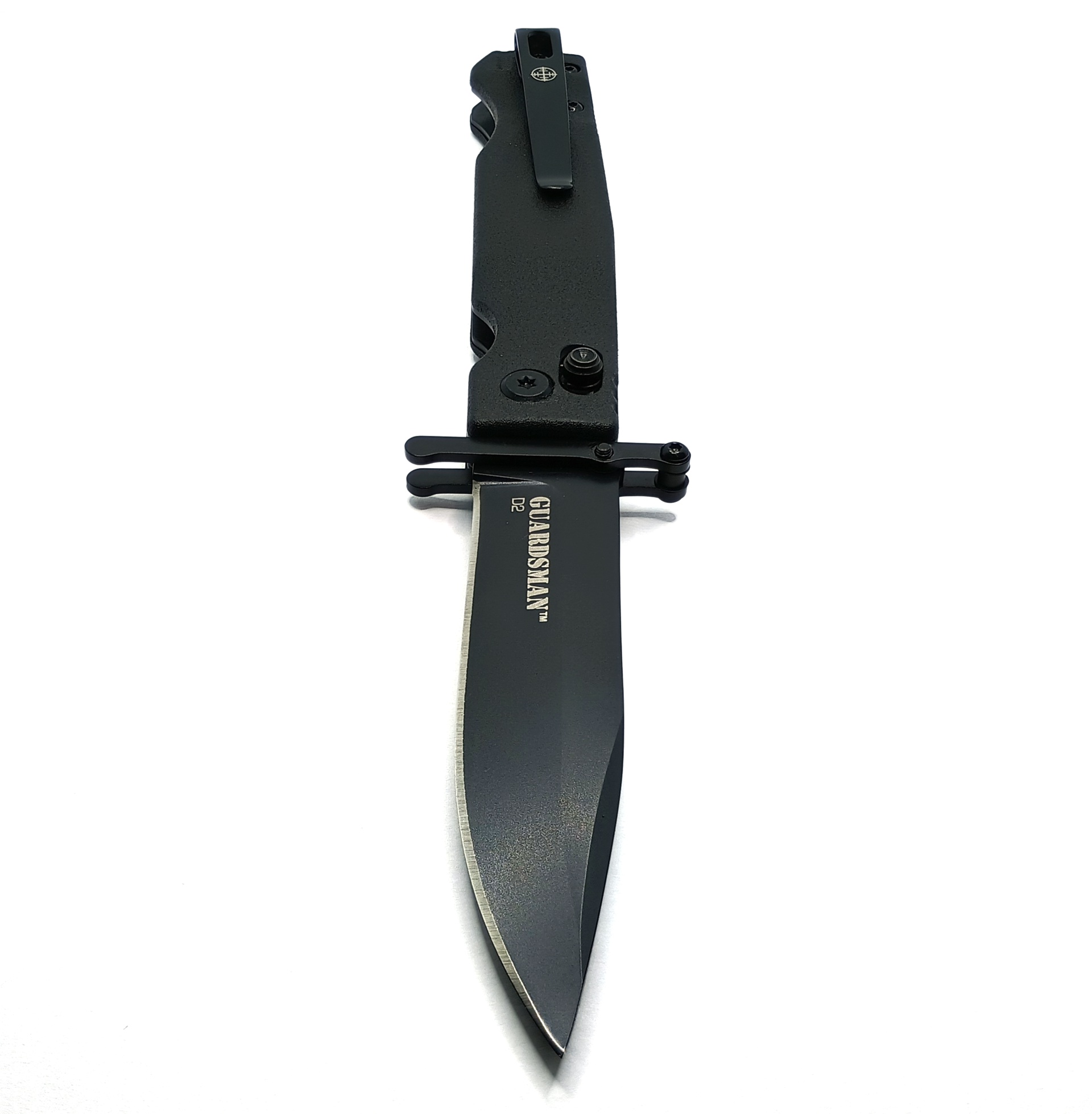
But when you open it, the guard pivots out with the blade.
This idea is neither new, nor unique. The SOG Quake leaps to mind, and the internet is just rife with those goddamn “Russian NKVD” folders these days. This is the “Italian swing guard” design and has occasionally (and probably also originally) been found on various stilettos over the years. I don’t know who actually invented it or when. If you want to know that sort of thing, ask a historian. I just take pictures of silly knives.
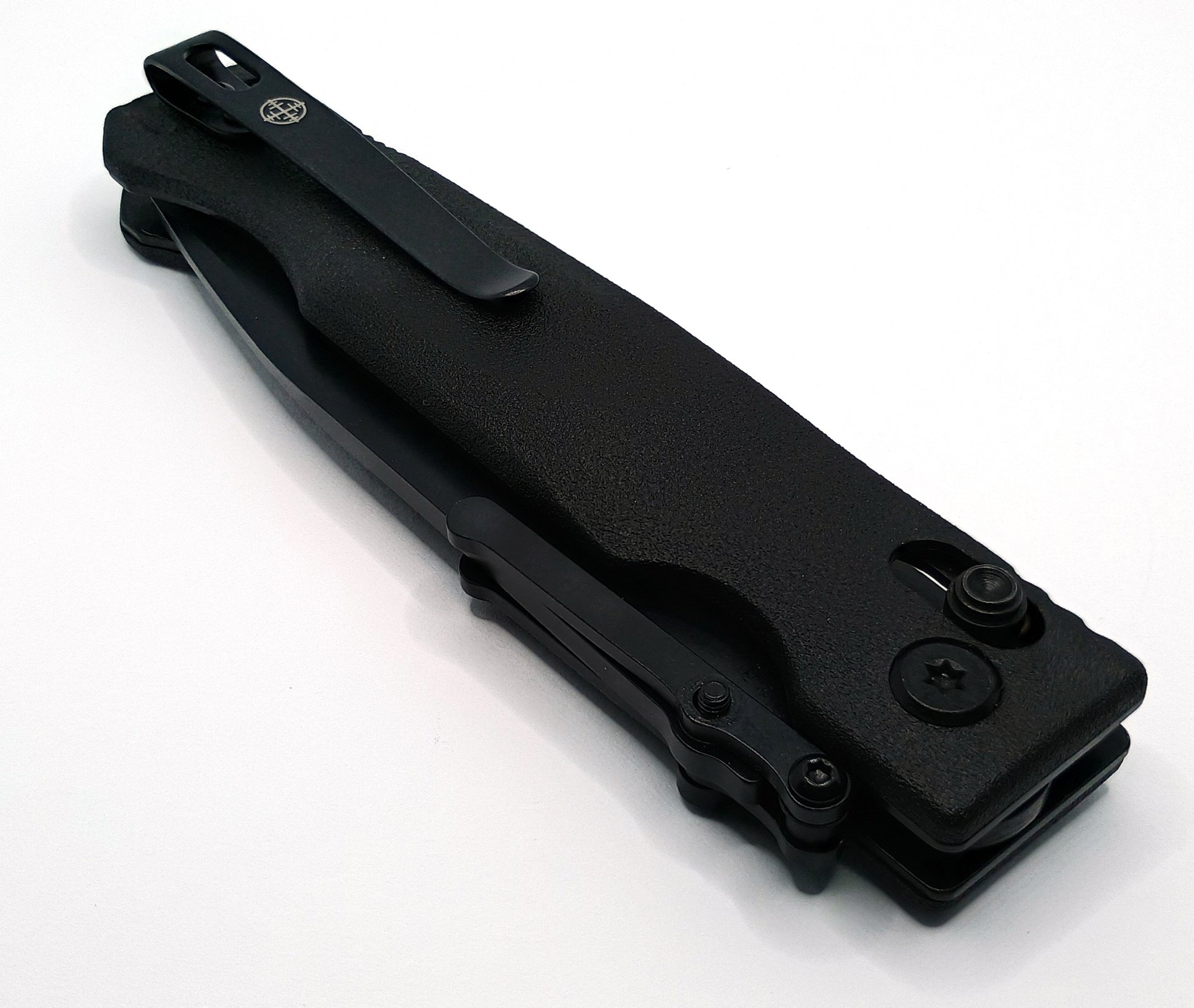
The Guardsman is like unto one of those but it takes its protein powder every morning so it’s got a distinct added beefiness. Out of all those among this breed I think it’s probably the least ridiculous and among the more functional. Not least of which because unlike the others it’s got an Axis or crossbar lock, and you know how I do enjoy a good one of those. Plus it’s made of D2 which is a steel I like, and it purports to have ball bearing pivots. All of those are plusses in my book.
Oh, and it also helps that it’s only about $27.
Let’s check off the rest of the list.
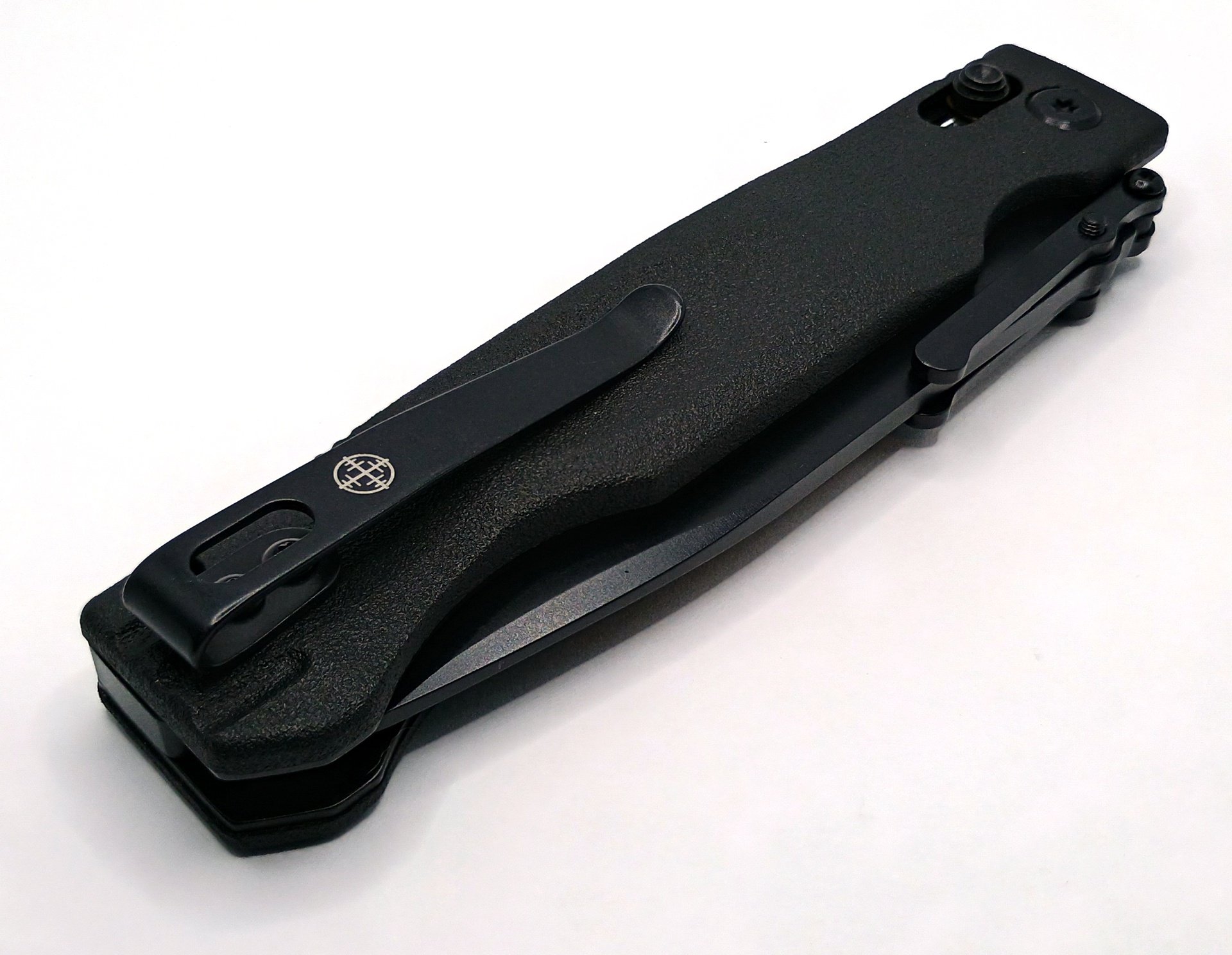
The Guardsman has modern and trendy a deep carry pocket clip.
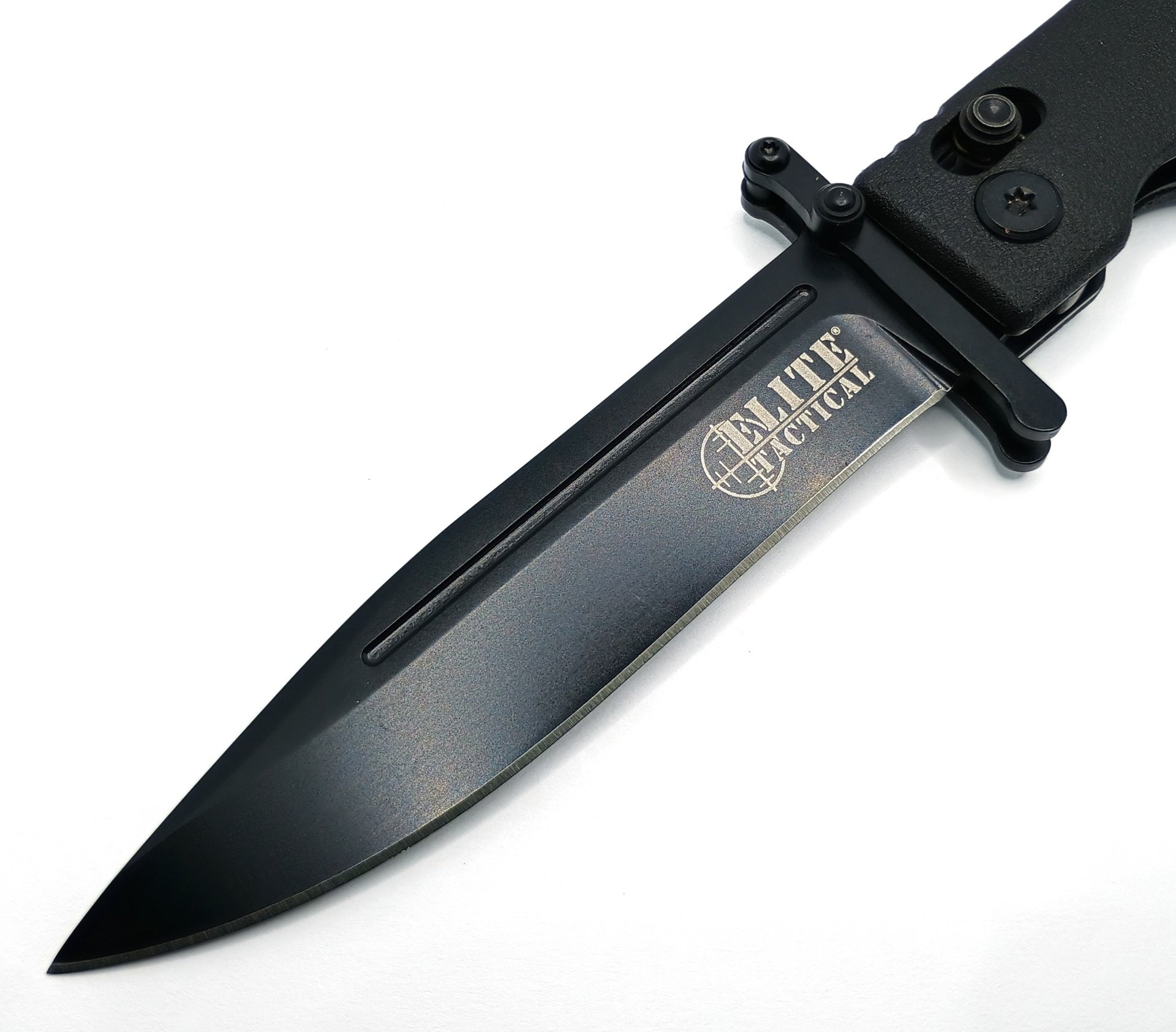
To add to its fighting knife pretensions, the Guardsman has a rather militaristic, Ka-Bar like drop point profile blade with a partial flat grind and a black powdercoat or epoxy finish. There’s even a fuller in it.
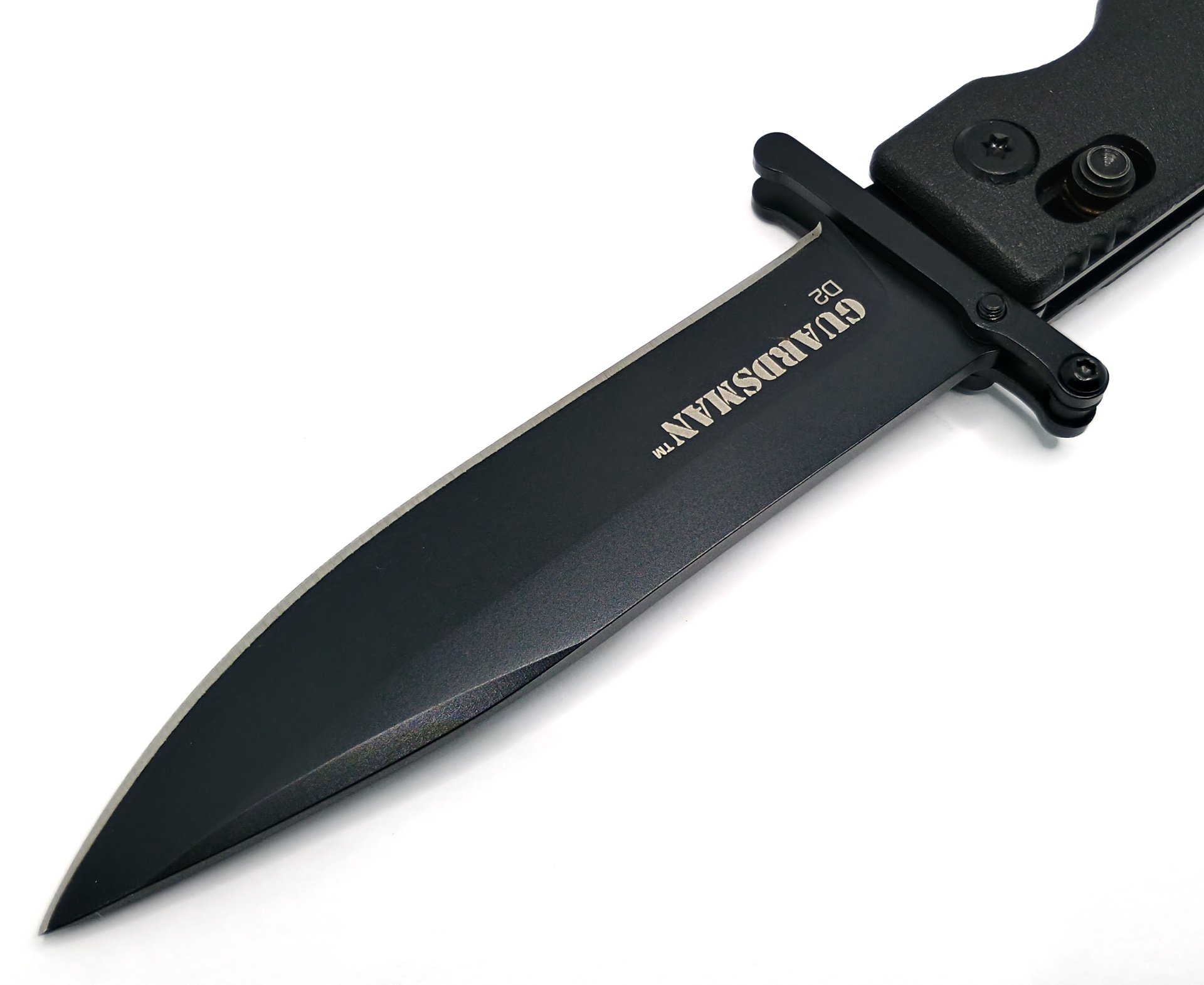
Although, curiously, only on one side.
It’s pretty long, 8-9/16" overall when open and 4-3/4" closed. It’s 1-5/8" across if you count the crossguard or about 15/16" if you don’t. The blade is 3-7/8" long. Altogether it weighs in at 126.9 grams or 4.48 ounces, part of that weight doubtlessly contributed to by its full length steel liners. The blade is 0.120" thick across and the entire knife, not including the clip as usual, is 0.616" across its handles at the thickest point. Needless to say, it’s made in China and marked as such on the blade. Beneath the crossguard, curiously. More on that in a sec.
All the pictures of this knife online seem to depict it with some kind of charcoal-on-black 3D machined Micarta scales or similar. But my example hasn’t got those, and instead has scales that appear to be made out of some kind of injection molded something. Probably glass filled nylon. They are quite heavily textured, though. Maybe this is some kind of rolling change. Maybe mine’s a counterfeit. Who knows.
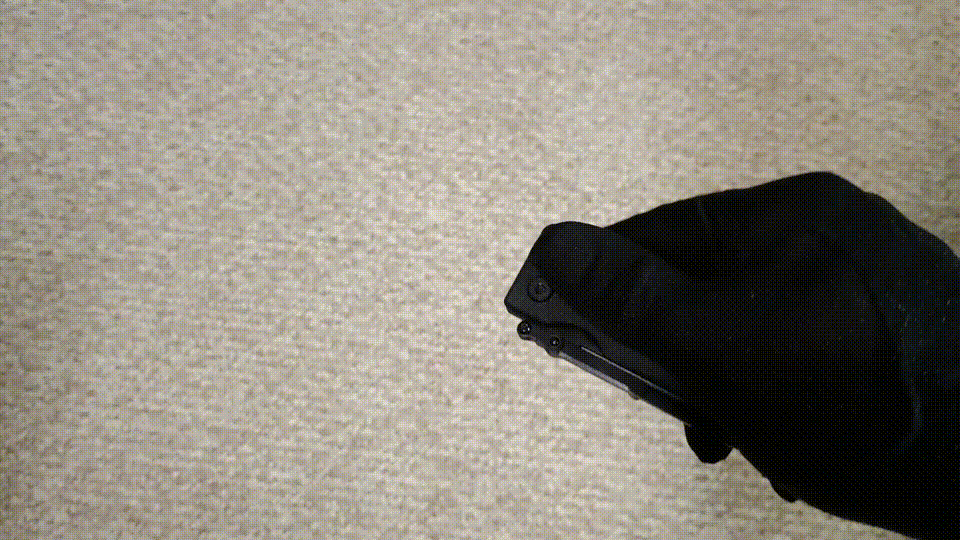
It must be said that the Guardsman’s pivoting action is quite satisfactory. I’m not going to claim revelatory or anything, although it’s damn good for the price. It’ll Axis flick readily, and in fact will fall open or shut easily via gravity if you hold its locking crossbar back. That’s just as well, because while it does have a thumb stud for opening it’s only got it on one side. The clip isn’t reversible, either. At least it’ll ride tip up in its one and only carry position.
The crossguard does indeed fold out automatically with the blade via a very simple mechanism. While it works, that part of it is on shakier mechanical ground.
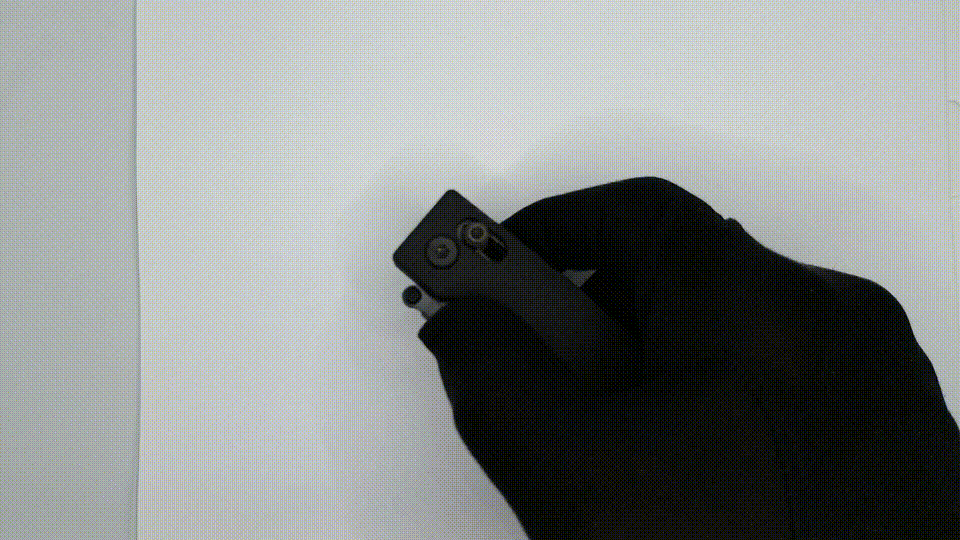
I’m not 100% sold on the whole crossguard thing as it works here, truth be told. It doesn’t lock into place and there’s a fair bit of free play left in it when the knife is locked open, as illustrated above. You can push it forward pretty far which doesn’t inspire much confidence in saving your fingers at first blush, although closer inspection reveals that there’s a pretty generous ricasso at the base of the blade and the crossguard can’t in fact be pushed past that point.
So you’re ultimately saved from giving yourself the mother of all papercuts. But the overall feeling is… incomplete, if that makes sense? It feels more natural that the crossguard should lock solid when the knife is open like the blade itself does, but it doesn’t. It could have, via the addition of maybe a little nub on the spine right at the forward end. But that’d sully the square, businesslike looks, I guess.
The guard can’t be pushed backwards towards the wielder, though. So obviously it’s more for, what, blocking incoming strikes or something? Against your sub 4" folding pocketknife? I’m not buying it. I’ll freely admit that I’ve never had to drop and give anyone 20, soldier, nor have I spent much time on my elbows in the battlefield. But if I were going to make a habit of it, I have to say I’d probably pack something a bit less… foldy.
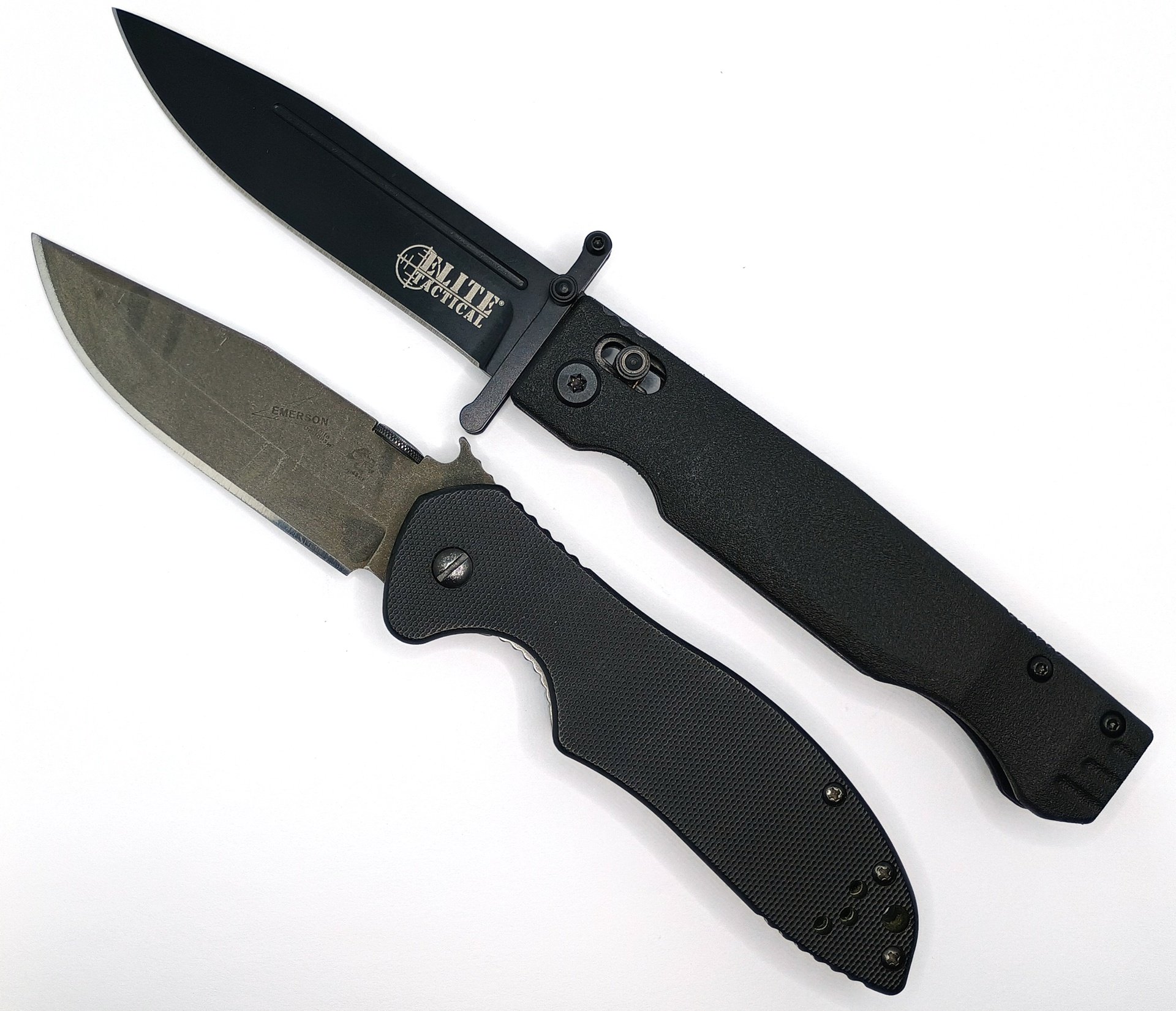
You could argue instead that the Guardsman is intended more as a self-defense knife, maybe. That’s fair, and the crossguard probably would protect you from yourself pretty effectively if you got a little too enthusiastic rendering undo Caesar – rocking horse action aside. But then, a humble Kershaw CQC-6K is still faster to draw.
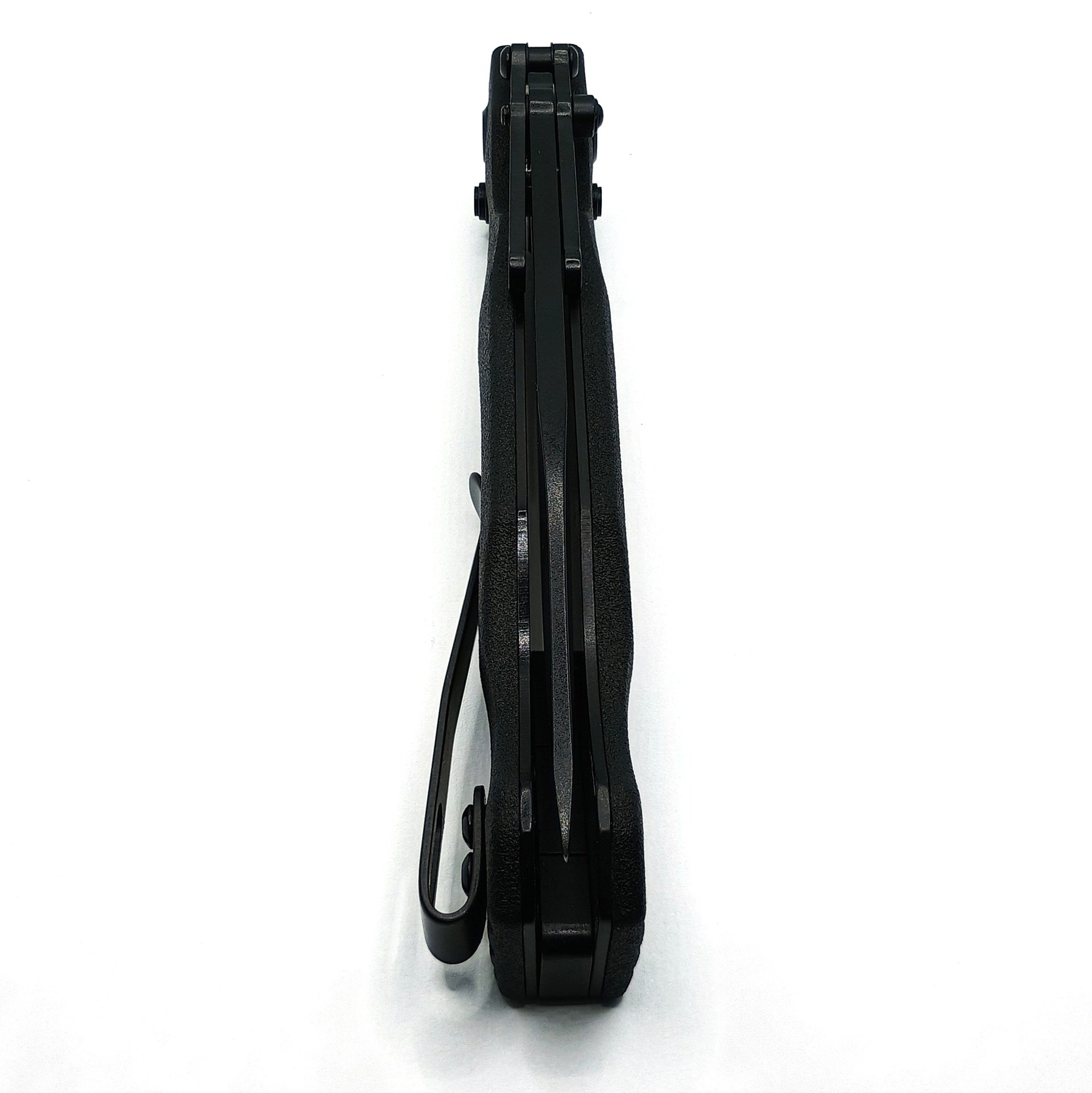
The Guardsman will be more discreet to carry despite being longer, though, thanks to its deep carry clip.

A CQC won’t broadcast to the world that you’re Elite, either.
The Guardsman has one more thing going for it, at least on paper. It claims to have ball bearing pivots. Well, as you know I like to keep knife makers honest. So, does it?
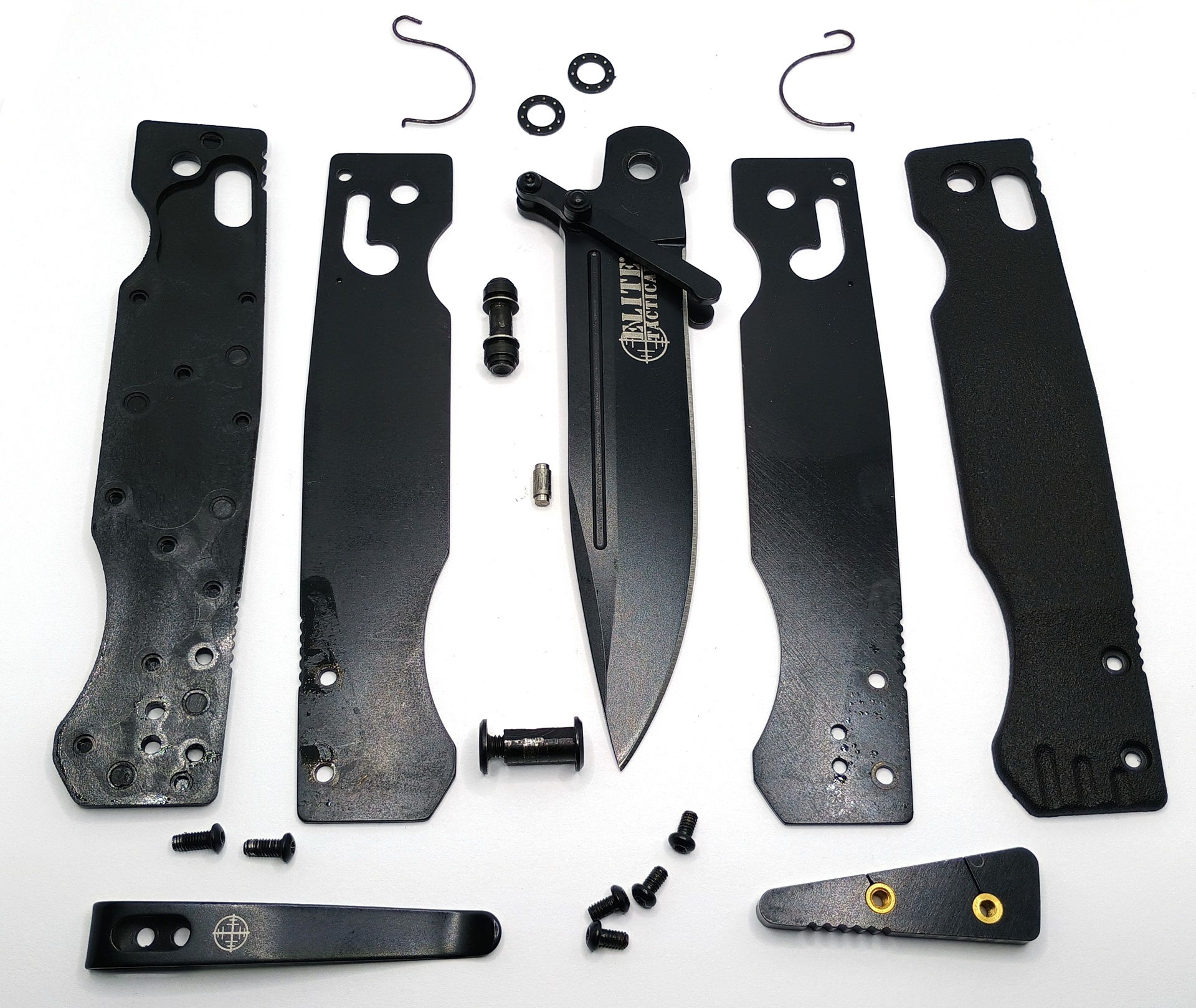
Yep, it sure does.
Inside, the Guardsman has exactly the Axis/crossbar componentry you’d expect. Complete with two omega hair springs, the crossbar itself, and the familiar quarter-note slots for the same in the liners. Overall it’s pretty easy to take apart, although do take care that the liners can be reinstalled backwards which will prevent you from mounting the clip, since its screws thread into a pair of holes present only on one of them.
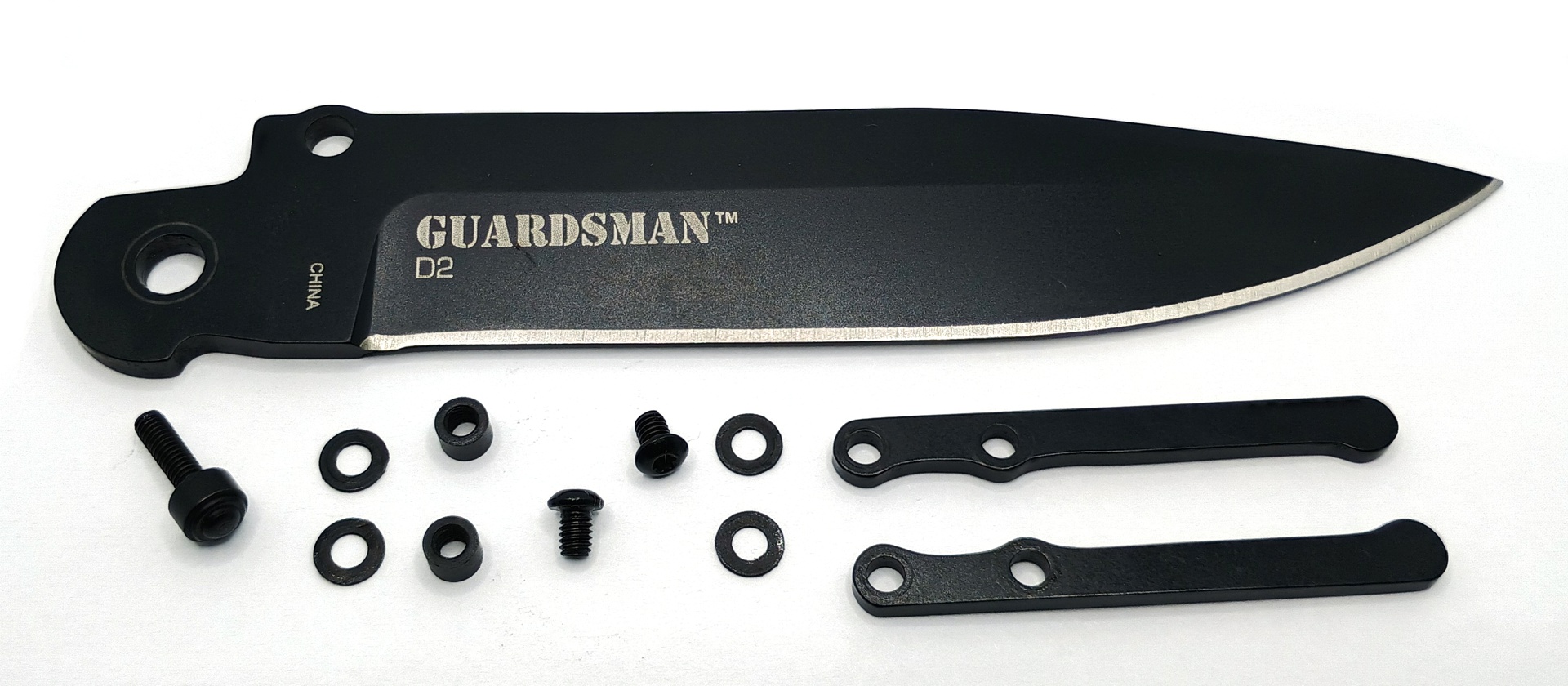
I have to say, despite my complaints about it that crossguard is definitely engineered. You can break it down further into these components and it contains no less than four tiny plastic washers, a pair of threaded aluminum spacers, and these screws. One of them is the thumb stud and you can with care take it out and reverse it – although you still can’t reverse the clip if you do.
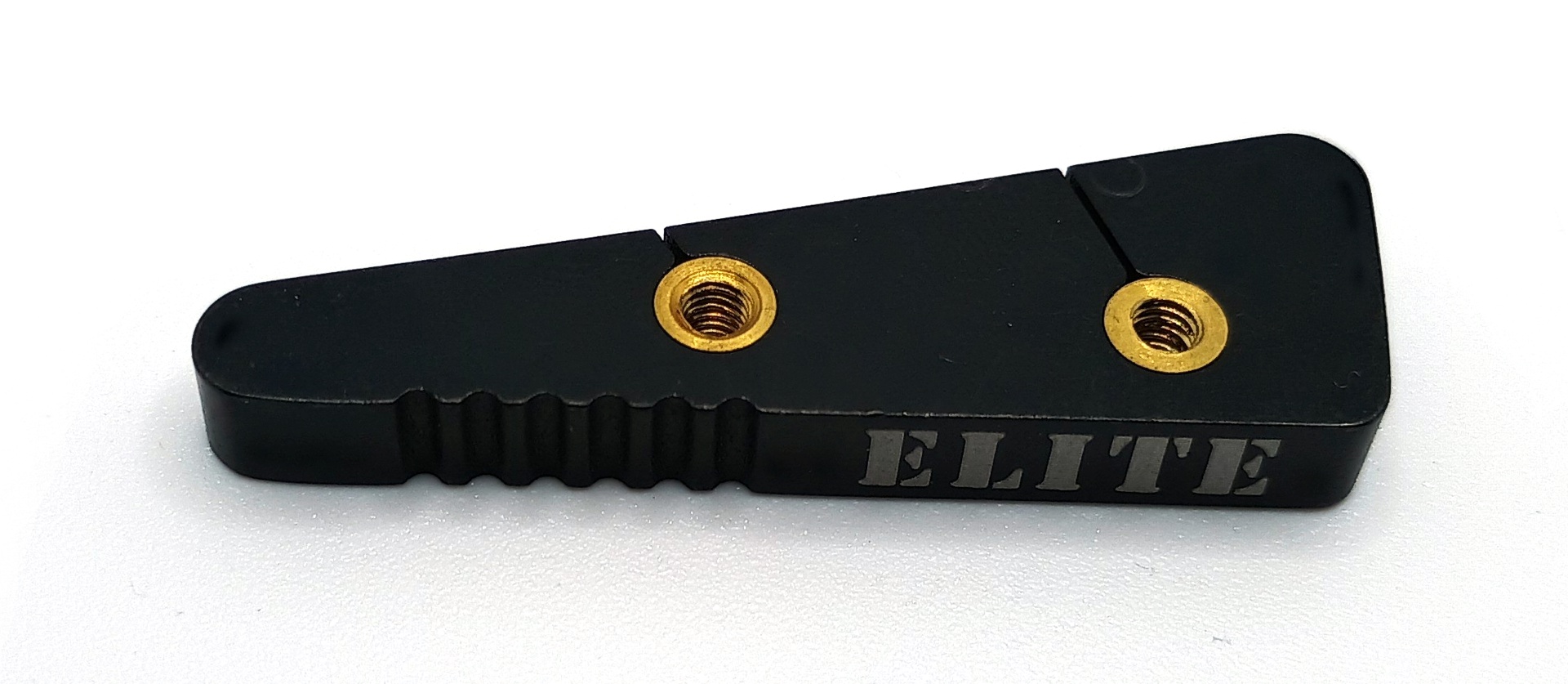
The halves are separated by this rather nice machined aluminum backspacer, which has threaded brass inserts in it. It has slots milled into it to provide enough flex to install the inserts, which is an unusual and certainly interesting way to do it.
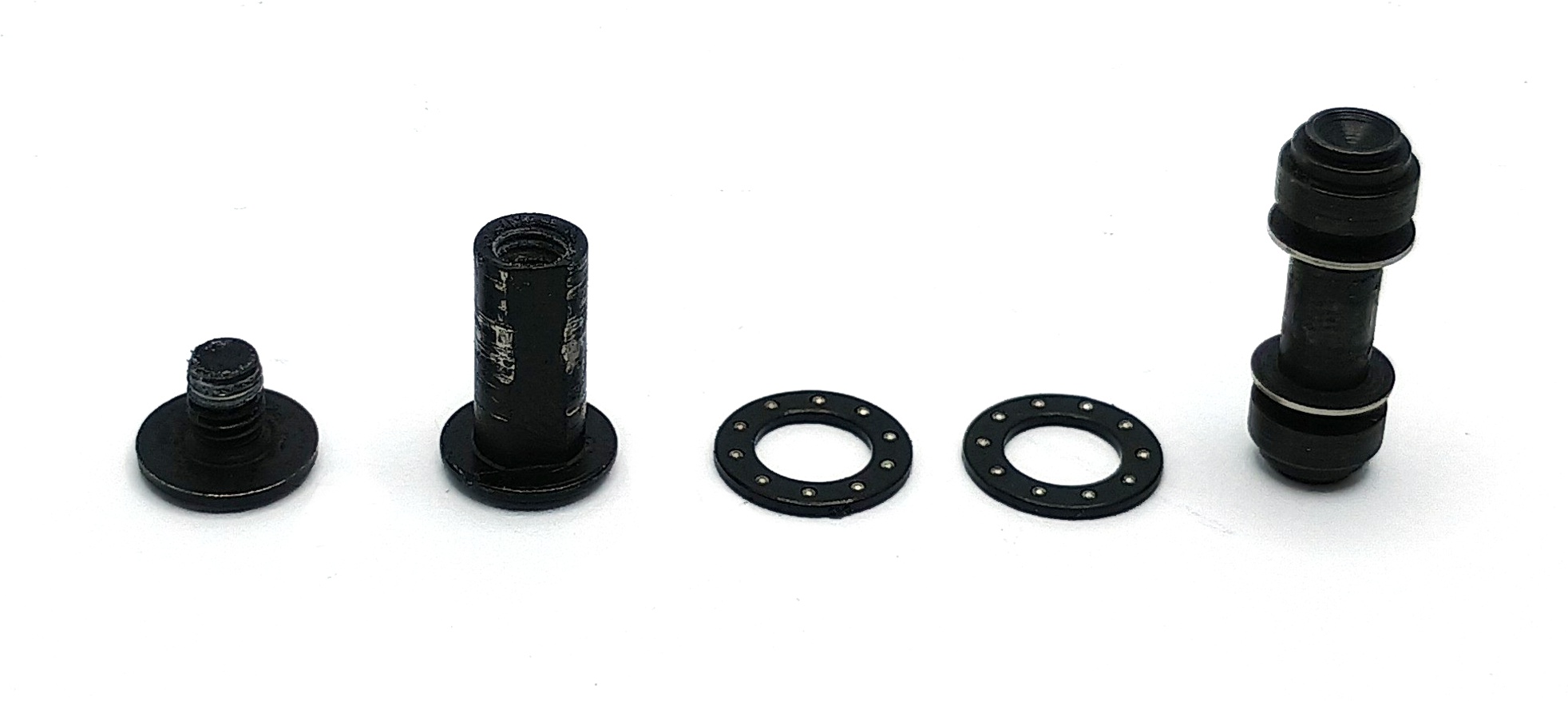
Here are the mechanical gubbins. The crossbar has a unique design with what appear to be a pair of independent washers to hold the hooks on the springs, and they’re swaged onto it or something. Search me how these were installed, since they’re an interference fit and don’t move, but the crossbar doesn’t unscrew or otherwise come apart in any way I can figure out.
The bearings have ten balls each in plastic carriers. Neither the blade nor the liners are pocketed to accept the bearings, so upon reassembly you have to line everything up manually. Holding the crossbar back helps. It’s kind of a fiddle but otherwise not too difficult.
Also for some reason the pivot screw has an anti-rotation flat on it, but the holes in the liners and scales have no corresponding flat spot and are just round. So you need two T8 Torx drivers to take it apart. As usual for a bearing knife, the Guardsman is pretty insensitive to pivot screw tension and because of that it can be locked down firmly to have no blade wiggle in any direction.
The Inevitable Conclusion
Look past the weird crossguard thing and the Elite Tactical Guardsman has all the fixings of an underrated gem of an inexpensive little knife – or rather a big one. It’s tough to argue with an Axis locking, bearing pivot, D2 folder for only $27. And it’s also built pretty well on top of it. Okay, the guard is a little hinky but other than that nothing about it manages to come off as feeling very cheap.
I could surely come up with a lot more interesting to say about it if it were a piece of crap. But it isn’t. Go fuckin’ figure.
And you can own it without looking like a goomba, a skinhead, or a tankie. That’s gotta count for something, right?
Fwiw, the whole guard on a fighting knife thing does have a point, pun intended.
It can be used, on bigger knives as an actual guard, to stop other weapons from sliding past, thus allowing a knife to be used defensively, which they are pretty damn bad at overall.
But the main thing is that it keeps you from slipping past it on a thrust. As such, it doesn’t need to be the kind of big guard you see on bowies to be useful. As long as it’s enough to keep your meat from meeting the edge, it’s all good. This can also make some atypical grips viable, but that’s cake.
Now, if you run into serious knife fighting geeks (and they exist, I’m not the only one), you can end up in boring debates about the exact configurations of guards and their benefits vs other knives, or non edged weapons, and that can get kinda eye rolly even if you’re a knife geek, but there are reasons for the various types.
But, I would argue that guards aren’t mandatory, assuming you don’t intend to stab anything. Would I want to spar using wooden trainers without a guard? Hell no, I like my fingers unbroken, thank you. But truth is that even in sparring, you can manage without a guard in a pinch, with the necessity of it decreasing as the skill of your training partner decreases.
But, you get into a sparring session that’s mimicking knife vs knife, and you’re both experienced, you want a guard. Pretty much every sparring session with any non-kerambit style involves attacking the weapon and/or weapon hand. Gets called “defanging the serpent”, depending on what kind of background the classes come from. You start to prefer a guard PDQ. Even with gloves, you get whacked on the knuckles a few times, you get really twitchy about having one lol. Same if you train against escrima, staffs, or pretty much anything that can have as much or more reach than your training knife.
This guard on this knife is a thumb rest tbh. It’s a great place for leverage, and if you had to shove it into something fast it would keep you from slicing your hand open.
It’s a good day when one of these write-ups pops up in my feed. Excellent.



